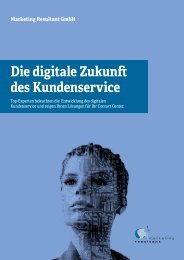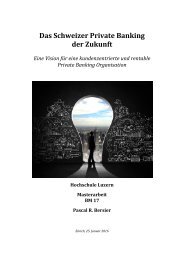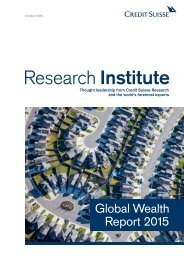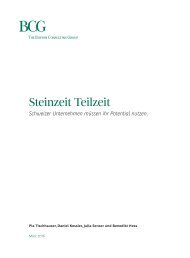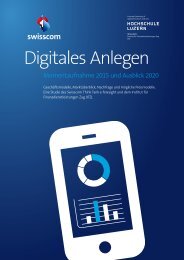Technology
tax14-technology-abo-version-lowres-151020
tax14-technology-abo-version-lowres-151020
You also want an ePaper? Increase the reach of your titles
YUMPU automatically turns print PDFs into web optimized ePapers that Google loves.
<strong>Technology</strong><br />
2<br />
IP as a threshold issue for digital<br />
economy taxation<br />
Worldwide, tax authorities’ focus on IP is<br />
intensifying. “The way countries look at<br />
how IP is taxed influences the way we hold<br />
and manage our intellectual property,”<br />
says Bergmann, who in addition to<br />
co-chairing the Silicon Valley Tax Directors<br />
Group is also Vice President, Tax and<br />
Treasury, at NetApp, Inc., a Californiabased<br />
provider of computer storage and<br />
data management.<br />
Often IP is developed initially in one<br />
country and transferred offshore for future<br />
development in a tax-advantaged<br />
jurisdiction, while being commercialized in<br />
products and services that are sold in<br />
markets around the world. Countries such<br />
as Ireland, Luxembourg, Switzerland and<br />
the UK have been competing to lure<br />
multinationals’ IP and related development<br />
and commercialization functions onto their<br />
shores, using so-called “patent boxes”<br />
or “innovation boxes” with favorable<br />
tax terms and rates. Others have looked<br />
at what is known as “stateless income,”<br />
in cases where the IP licenses alone<br />
have been relocated to zero-tax locations,<br />
and begun to cry foul.<br />
All of which leads to another emerging<br />
trend in digital economy taxation. That<br />
is, any notion of zero-tax. Stateless income<br />
is now fading on the digital tax landscape,<br />
while companies are considering more<br />
onshoring of IP ownership together<br />
with related development and<br />
commercialization to countries with<br />
favorable tax environments.<br />
Silicon Valley issues urgent call for<br />
US innovation box<br />
In the context of this second trend in<br />
digital economy taxation, the Silicon Valley<br />
Tax Directors Group is pointing out to US<br />
legislators that while other countries have<br />
instituted patent boxes or innovation boxes,<br />
the US has not. “I’d say the single most<br />
important message to Congress today is<br />
that US international tax reform, including<br />
an innovation box, is urgent for this year,”<br />
Bergmann says.<br />
The urgency of Bergmann’s message<br />
is conveyed in terms of US jobs, the future<br />
of America’s R&D capacity and the<br />
preservation of its tax base. The multilateral<br />
BEPS guidelines and recent unilateral tax<br />
“… US<br />
international<br />
tax reform …<br />
is urgent<br />
for this year.”<br />
Jeffrey K. Bergmann<br />
Vice President, Tax and Treasury,<br />
of NetApp, Inc.<br />
changes are making it more critical than<br />
ever to revamp US tax laws, he says, given<br />
America’s worldwide tax system (compared<br />
to most countries’ territorial tax systems)<br />
and its comparatively high corporate tax<br />
rate (35%, vs. an OECD average of around<br />
25%).<br />
Otherwise, these converging pressures<br />
will increasingly incentivize US companies<br />
to develop and hold patents and other IP<br />
offshore, as more countries join the ranks<br />
of Ireland, Luxembourg, Switzerland<br />
and the UK in creating patent boxes and<br />
other IP-friendly terms and conditions.<br />
In an era of enormous digital innovation,<br />
the US risks seeing priceless IP ownership<br />
and R&D jobs migrate from the US to<br />
a range of other nations if it doesn’t take<br />
immediate action, Bergmann says.<br />
At the same time, an innovation box<br />
could be a mechanism to mitigate the<br />
“lockout effect” that the US tax system has<br />
had on some expensive-to-repatriate<br />
overseas earnings on IP, as his group’s<br />
78 member companies have written to key<br />
congressional representatives. Their<br />
letters to Congress state that existing tax<br />
laws effectively preclude companies with<br />
IP abroad from bringing it back to the US.<br />
Instead, they ask for an innovation box<br />
with a lower tax rate — one that also allows<br />
US corporations to treat a distribution<br />
of qualifying IP from a controlled foreign<br />
corporation as a dividend eligible for a<br />
100% deduction, to allow IP held abroad to<br />
be transferred tax-free to the US.<br />
Key legislators are now circulating<br />
a discussion draft to legislate the<br />
creation of a US innovation box. And while<br />
the US presidential election may impact<br />
Congress’s ability to pass comprehensive<br />
tax legislation and other measures,<br />
Bergmann says there is increasing<br />
receptivity to moving the innovation box<br />
forward. “We think it’s urgently needed<br />
this year,” he concludes.<br />
3<br />
Taxable presence in a virtual world<br />
The rules on what constitutes a taxable<br />
presence in a country are also changing<br />
rapidly as a result of the digital economy.<br />
While the OECD BEPS Project has<br />
been finalizing its approach to PE, some<br />
member countries have moved ahead with<br />
new taxes (e.g., the UK’s diverted profits<br />
tax) or administrative procedures<br />
addressing what they perceive as artificial<br />
avoidance of PE, enabled by digital<br />
economy business models. Other countries,<br />
meanwhile, have proposed or declared<br />
that a certain type or level of digital<br />
business can constitute a “virtual PE”<br />
in their country for tax purposes.<br />
Frustration is leading some in the<br />
private sector to question just how far the<br />
proliferation of PEs will go, with all of<br />
their attendant obligations for taxes and<br />
compliance, and whether this trend<br />
could only undermine the international<br />
goal of advancing shared stakes in global<br />
investment and trade.<br />
Digitization ushers in tax transparency<br />
Underpinning digital economy taxation<br />
will be the OECD’s new country-by-country<br />
(CbC) reports, due as early as 2017, for<br />
2016 financial data in countries adopting<br />
their use. (A group including Australia,<br />
Canada, France, Germany, Japan and the<br />
UK has already established such an<br />
exchange.)<br />
The CbC reports’ initiative calls for<br />
comprehensive global operational<br />
reporting by companies (including<br />
coverage of all locations, legal entities and<br />
branches of operation), to be shared<br />
among relevant countries via government<br />
information exchange mechanisms.<br />
Digitally enabled themselves, the<br />
standardized CbC reports are expected to<br />
usher in a new era of tax transparency.<br />
In some ways, greater transparency<br />
in taxation has already taken center stage<br />
in the competition among nations to<br />
promote investment in their own digital<br />
economies. Competing tax jurisdictions<br />
44 EY – Tax Insights for business leaders №14



